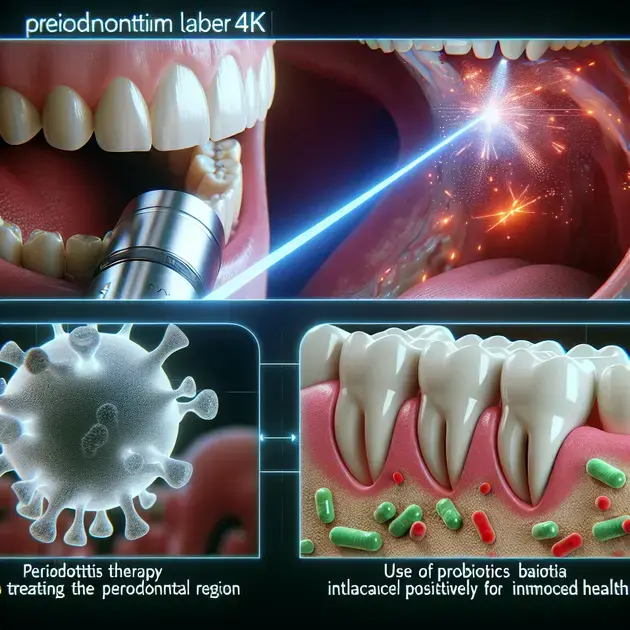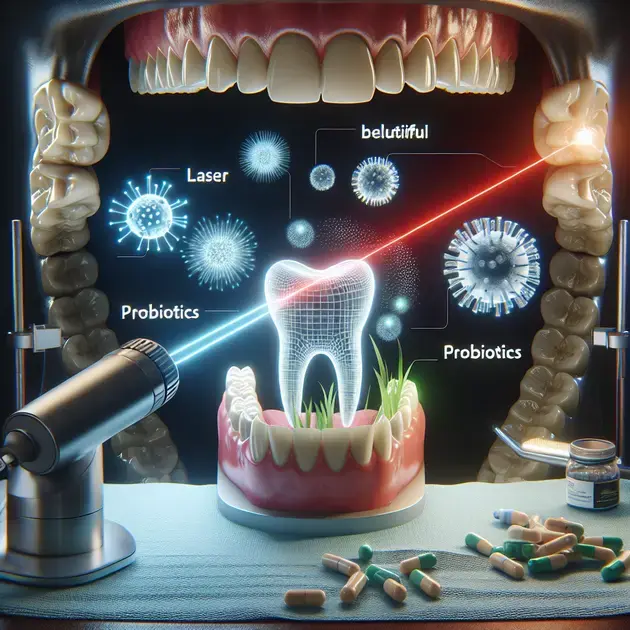When it comes to combating periodontitis, medication can be a vital component in the treatment plan. In this guide, we will explore the various medication options available for periodontitis treatment.
From antibiotics to antimicrobial mouthwashes, understanding the different types of medications can help manage the symptoms of periodontitis and support overall oral health. Stay informed about the latest advancements in periodontitis treatment with this medication guide.

Effective Medications for Periodontitis Treatment
Periodontitis is a serious gum infection that damages the soft tissue and can destroy the bone that supports your teeth. It is important to use effective medications to treat this condition and prevent further complications. Here is a step-by-step guide on how to effectively manage periodontitis treatment:
1. Consult with a Periodontist:
The first step in treating periodontitis is to consult with a periodontist, who is a dentist specialized in the prevention, diagnosis, and treatment of periodontal disease. They will evaluate the condition of your gums and recommend the most suitable treatment plan.
2. Antibiotic Therapy:
Antibiotics are commonly prescribed to combat the bacterial infection that causes periodontitis. Your periodontist may recommend antibiotics in the form of pills, mouth rinses, or gels to help control the infection and promote healing.
3. Scaling and Root Planing:
This deep cleaning procedure is essential for removing plaque and tartar from the teeth and roots. It helps to smooth the root surfaces to prevent bacteria from accumulating and causing further infection.
4. Maintenance Therapy:
After the initial treatment, it is crucial to follow a maintenance plan to prevent the recurrence of periodontitis. This may include regular dental cleanings, proper oral hygiene practices, and consistent follow-ups with your periodontist.
5. Topical Medications:
Topical medications such as antimicrobial mouthwashes or gels can be used as adjunctive therapy to help reduce bacteria in the mouth and promote gum healing. Follow your periodontist’s instructions on how to use these medications effectively.
Antibiotic Therapy for Periodontitis
Antibiotic therapy is a common treatment approach for periodontitis to help control the bacterial infection and promote healing. Here is a detailed look at how antibiotic therapy can be used effectively for treating periodontitis:
1. Types of Antibiotics:
There are different types of antibiotics that may be prescribed for periodontitis, including tetracycline, doxycycline, and metronidazole. These antibiotics work by targeting the bacteria responsible for the gum infection.
2. Duration of Treatment:
Antibiotic therapy for periodontitis is usually prescribed for a specific period, depending on the severity of the infection. It is essential to complete the full course of antibiotics as instructed by your periodontist to ensure effective treatment.
3. Combination Therapy:
In some cases, your periodontist may recommend a combination of antibiotics to target a wider range of bacteria and improve treatment outcomes. Always follow your dentist’s recommendations for the best results.
4. Side Effects:
Like any medication, antibiotics for periodontitis may have side effects such as nausea, diarrhea, or allergic reactions. It is important to inform your periodontist if you experience any adverse effects during the treatment.
5. Follow-up Visits:
After completing the antibiotic therapy, regular follow-up visits with your periodontist are essential to monitor the healing progress and make any necessary adjustments to your treatment plan.
Exploring Antimicrobial Mouthwashes for Periodontitis
Antimicrobial mouthwashes can be a valuable addition to your oral hygiene routine, especially when managing periodontitis. Here are some tips on exploring antimicrobial mouthwashes for treating periodontitis:
1. Choosing the Right Mouthwash:
Look for antimicrobial mouthwashes that are specifically formulated to fight bacteria and reduce plaque buildup. Brands like Listerine Antiseptic Mouthwash or Crest Pro-Health Advanced Mouthwash are popular choices recommended by dentists.
2. Proper Usage:
Follow the instructions on the mouthwash label or as recommended by your dentist for the correct usage. Typically, you will swish the mouthwash around your mouth for a specific duration before spitting it out.
3. Frequency of Use:
Antimicrobial mouthwashes can be used daily as part of your oral care routine, especially for individuals with periodontitis. Incorporating it into your daily regimen can help reduce bacteria in the mouth and promote gum health.
4. Adjunct to Treatment:
Antimicrobial mouthwashes can complement other periodontal treatments such as scaling and root planing or antibiotic therapy. Using mouthwash regularly can help maintain oral health and prevent the recurrence of gum infections.
5. Consultation with a Dentist:
If you have specific concerns or questions about using antimicrobial mouthwashes for periodontitis, it is advisable to consult with your dentist. They can provide personalized recommendations based on your oral health needs.

Effective Medications for Periodontitis Treatment
Antibiotics are commonly prescribed for the treatment of periodontitis, a severe gum infection that can lead to tooth loss if left untreated. The most effective medications for periodontitis treatment are usually a combination of antibiotics, such as amoxicillin and metronidazole. These antibiotics work together to eliminate the bacteria causing the infection and reduce inflammation in the gums.
To effectively treat periodontitis with medications, it is crucial to follow your dentist’s instructions carefully. Typically, antibiotics are prescribed for a specific duration, and it is essential to complete the full course of treatment to ensure the infection is completely eradicated. Additionally, maintaining good oral hygiene practices, such as regular brushing and flossing, is essential to prevent future recurrences of periodontitis.
In some cases, antibiotic therapy may be complemented with other treatments, such as scaling and root planing, to remove plaque and tartar build-up from the teeth and gums. This comprehensive approach can help improve the overall health of the gums and prevent further progression of periodontitis.
Overall, effective medications for periodontitis treatment play a crucial role in managing this serious gum infection. By following your dentist’s advice and maintaining good oral hygiene habits, you can effectively combat periodontitis and preserve your dental health.
Antibiotic Therapy for Periodontitis
Antibiotic therapy is a common treatment for periodontitis, a severe gum disease that can cause tooth loss if left untreated. The use of antibiotics, such as doxycycline or minocycline, can help eliminate the bacteria responsible for the infection and reduce inflammation in the gums. These medications are typically prescribed in conjunction with other treatments, such as scaling and root planing, to effectively manage periodontitis.
When undergoing antibiotic therapy for periodontitis, it is essential to follow your dentist’s instructions carefully. This includes taking the prescribed medication for the specified duration and attending follow-up appointments to monitor your progress. Additionally, maintaining good oral hygiene practices, like regular brushing and flossing, is crucial to support the effectiveness of antibiotic therapy.
While antibiotic therapy can be an effective treatment for periodontitis, it is important to be aware of potential side effects, such as gastrointestinal upset or antibiotic resistance. Your dentist will monitor your response to the medication and may adjust your treatment plan accordingly to ensure optimal results.
In conclusion, antibiotic therapy is a valuable tool in the treatment of periodontitis. By working in conjunction with other dental treatments and maintaining good oral hygiene, antibiotics can help combat the infection and promote healing in the gums, ultimately preserving your dental health.
Exploring Antimicrobial Mouthwashes for Periodontitis
In addition to antibiotics and other dental treatments, antimicrobial mouthwashes play a crucial role in the management of periodontitis. These specialized mouthwashes contain ingredients that help reduce the bacteria in the mouth, promoting gum health and preventing further progression of the infection.
Antimicrobial mouthwashes typically contain active ingredients like chlorhexidine, which is known for its antimicrobial properties. When used as directed, these mouthwashes can help reduce plaque build-up, soothe gum inflammation, and freshen breath, making them a valuable addition to your oral hygiene routine.
When considering antimicrobial mouthwashes for periodontitis treatment, it is essential to consult with your dentist to determine the most suitable option for your specific needs. Your dentist can recommend a mouthwash that targets the bacteria causing the infection and supports your overall oral health.
Incorporating an antimicrobial mouthwash into your daily oral care routine can help enhance the effectiveness of your periodontitis treatment. By using these specialized mouthwashes in conjunction with antibiotics and regular dental cleanings, you can actively combat the infection and promote healing in your gums.
**
Conclusion
**
Effective medications, including antibiotics like amoxicillin and metronidazole, are crucial for treating periodontitis and preventing potential tooth loss. These antibiotics work in harmony to eliminate harmful bacteria and reduce gum inflammation, playing a significant role in managing this severe gum infection.
To ensure successful treatment, it is essential to adhere closely to your dentist’s instructions when using medications for periodontitis. Completing the full course of antibiotics as prescribed is vital for eradicating the infection entirely, coupled with maintaining good oral hygiene practices such as regular brushing and flossing to prevent recurrence.
Complementing antibiotic therapy with additional treatments like scaling and root planing can further enhance the outcome by removing plaque and tartar build-up, ultimately bolstering gum health and halting the progression of periodontitis. By following professional advice and practicing proper oral care, individuals can effectively combat periodontitis and safeguard their dental well-being for the long term.



